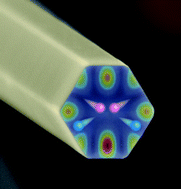Authors from Harvard University and Korea University discuss the science and technology of nanowire-based photovoltaics in their recent EES review.
They review the unique benefits and remaining challenges, such as scaling, of nanowires for photovoltaics and the progress towards understanding and optimizing the electrical and optical performance of nanowire devices. Advances in the synthesis, characterisation and control of the unique optical properties of nanowires along with their assembly and scaling into diverse arrays are presented.
Nanowires have emerged as one promising platform to explore next-generation solar cells that can operate more efficiently and be produced at a lower cost. Their small dimensions allow for efficient charge separation and light absorption properties different to bulk materials. The high cost of photovoltaics is currently a major limiting factor to the widespread use of solar power.
Read this review today:
Semiconductor nanowires: a platform for exploring limits and concepts for nano-enabled solar cells
Thomas J. Kempa, Robert W. Day, Sun-Kyung Kim, Hong-Gyu Park and Charles M. Lieber
DOI: 10.1039/C3EE24182C











